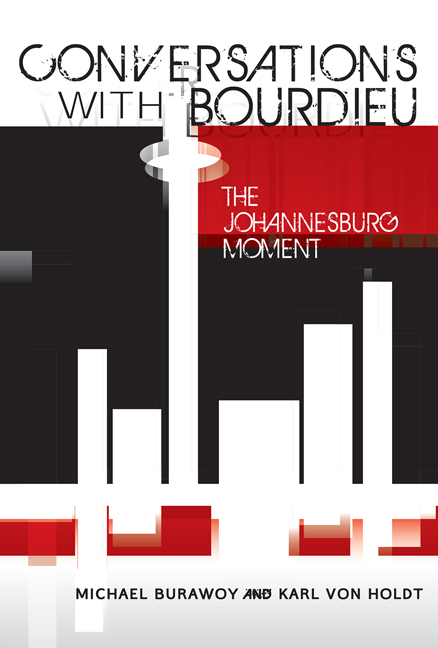Book contents
- Frontmatter
- Contents
- Abbreviations and acronyms
- Preface
- Prologue The Johannesburg Moment
- Acknowledgements
- CONVERSATION 1 SOCIOLOGY AS A COMBAT SPORT
- Bourdieu Meets Bourdieu
- Bourdieu in South Africa
- CONVERSATION 2 Theory and Practice
- CONVERSATION 3 CULTURAL DOMINATION
- CONVERSATION 4 COLONIALISM AND REVOLUTION
- CONVERSATION 5 PEDAGOGY OF THE OPPRESSED
- CONVERSATION 6 THE ANTINOMIES OF FEMINISM
- CONVERSATION 7 INTELLECTUALS AND THEIR PUBLICS
- CONVERSATION 8 MANUFACTURING DISSENT
- Epilogue Travelling Theory
- Bibliography
- Index
Bourdieu Meets Bourdieu
from CONVERSATION 1 - SOCIOLOGY AS A COMBAT SPORT
Published online by Cambridge University Press: 20 April 2018
- Frontmatter
- Contents
- Abbreviations and acronyms
- Preface
- Prologue The Johannesburg Moment
- Acknowledgements
- CONVERSATION 1 SOCIOLOGY AS A COMBAT SPORT
- Bourdieu Meets Bourdieu
- Bourdieu in South Africa
- CONVERSATION 2 Theory and Practice
- CONVERSATION 3 CULTURAL DOMINATION
- CONVERSATION 4 COLONIALISM AND REVOLUTION
- CONVERSATION 5 PEDAGOGY OF THE OPPRESSED
- CONVERSATION 6 THE ANTINOMIES OF FEMINISM
- CONVERSATION 7 INTELLECTUALS AND THEIR PUBLICS
- CONVERSATION 8 MANUFACTURING DISSENT
- Epilogue Travelling Theory
- Bibliography
- Index
Summary
I often say sociology is a combat sport, a means of self-defence. Basically, you use it to defend yourself, without having the right to use it for unfair attacks.
Pierre BourdieuThese sentences are taken from La Sociologie est un sport de combat, a popular film produced by Pierre Carles in 2001 about the life of Pierre Bourdieu featuring him at demonstrations, in interviews about masculine domination, in humorous banter with his assistants, in an informal research seminar with his colleagues, in the lecture hall, on television debating with Günter Grass and, in a final dramatic scene, facing the wrath of immigrants. We see Bourdieu voicing opposition to government policies and especially neoliberalism, but we also see him on the defensive – stumbling to explain sociology in simple terms to a confused interviewer, or sweating under pressure of interrogation or intensely nervous when he has to speak in English.
Is this sociology as a combat sport? If so, where are the combatants? We see Bourdieu, but where is the opposition? Where are the other contestants? It's like watching a boxing match with only one boxer. No wonder he can talk of sociology as ‘self-defence’; no wonder he can seem so innocent and charming with the opposition absent. Where is the reviled Bourdieu, ‘the sociological terrorist of the left’, ‘the cult leader’, ‘the intellectual dictator’? Even the Spanish feminist interviewing him about masculine domination lets him off the hook when it comes to his own masculinity – at which point he leans on Virginia Woolf – or when he claims to understand masculine domination better than women do. Significantly, the only time he comes under hostile fire is when young immigrants tell him they are not interested in his disquisitions on oppression – after all, they know they are oppressed – whereupon Bourdieu goes on a tirade against their anti-intellectualism. It seems he has nothing to offer them but words. Here, only at the end of the film, are the first signs of combat.
This absent combat with the absent enemy is not peculiar to the film. Throughout Bourdieu's writings, combatants are slain off-stage with no more than a fleeting appearance in front of the readership. Sociologists, economists and philosophers come and go like puppets, dismissed with barely a sentence or two.
- Type
- Chapter
- Information
- Conversations with BourdieuThe Johannesburg Moment, pp. 9 - 24Publisher: Wits University PressPrint publication year: 2012

